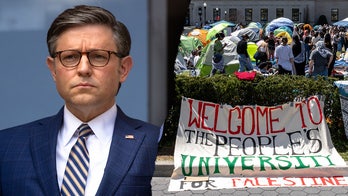The growing backlash over the government's use of high-tech body scanners finally comes to a head Wednesday, the day activists have urged airline passengers to opt out of what they call a virtual strip search and submit to an "enhanced" pat-down.
National Opt-Out Day arrives the day before Thanksgiving, one of the busiest travel days of the year. More than 24 million people are expected to fly on U.S. airlines over 12 days ending Nov. 30.
The boycott has not been organized beyond a website -- a weakness that will likely undermine the goal of organizers to cause headaches at airports across the country.
Yet TSA Administrator John Pistole still called the boycott "irresponsible."
"On the eve of a major national holiday and less than one year after Al Qaeda's failed attack last Christmas Day, it is irresponsible for a group to suggest travelers opt out of the very screening that could prevent an attack using non-metallic explosives," TSA Administrator John Pistole said in a written statement.
"After coming to TSA with 26 years of law enforcement experience at the FBI, I understand the serious threats our nation faces and the security measures we must implement to thwart potential attacks," he said. "This technology is not only safe, it's vital to aviation security and a critical measure to thwart potential terrorist attacks."
There are 385 body scanners at 68 airports around the country. TSA plans to have a total of 450 in use by the end of year and another 500 by the end of next year.
Airline passengers have also protested the new pat-downs that require screeners to touch their breasts or gentials.
Transportation Security Administration workers performing increasingly invasive searches say they want Thanksgiving travelers to know they're just doing their jobs – and trying to save lives.
Most passengers are docile at the nation's airports, though TSA agents say they have dealt with more pushback in recent weeks. One woman headbutted an officer who was searching her laptop. Other screeners report being punched, kicked and shoved during pat-downs.
The TSA says more than 98 percent of passengers chose body scans over other screening measures. The agency cites experts who say a body scan likely would have detected the powdered explosive that terror suspect Umar Farouk Abdulmutallab allegedly stuffed in his underwear and ignited aboard a flight from Amsterdam to Detroit on Christmas.
Last week, Homeland Secretary Janet Napolitano said she regrets "National Opt-Out Day."
"I really want to say, look, let's be realistic and use our common sense," she said, explaining that the screening technology has been in development since before the failed Christmas Day bombing attack last year.
"This is not about the government itself," she said. "We all have a role to play in security."
"And so I really regret some groups saying, 'Well, we don't want to be a part of that,'" she added. "I regret it because it's not what we're all about. What we're all about is shared responsibility."




